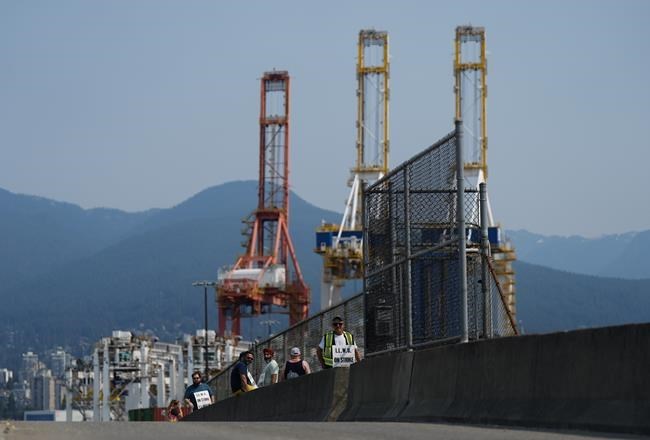VANCOUVER — Maritime employers in British Columbia are proposing binding arbitration to end the province's port strike, after talks with the workers' union deadlocked.
The BC Maritime Employers Association said in a statement on Wednesday that billions of dollars worth of cargo remain in limbo, disrupting critical supply chains and damaging relationships with international trading partners.
It said on the fifth day of the port strike that if the International Longshore and Warehouse Union Canada agreed to binding arbitration "port operations could resume quickly, critical goods could begin to flow again and there would be immediate stability and restoration to Canada’s supply chain operations."
The association said it first proposed mediated arbitration almost three weeks ago, a process it said would be shaped by both sides and only produce a binding outcome if necessary.
Talks between the employers association and the union stalled on Monday. More than 7,000 workers at 30 ports across B.C. have been on strike since Saturday morning.
"Fourteen consecutive work shifts shut down and five days of ILWU Canada’s strike action has potentially disrupted $3.7 billion of cargo — automotive parts, refrigerated food, fertilizer, critical minerals and goods that are not reaching Canadians, or our trading partners abroad," the association said.
A major North American railway said it had placed "temporary embargoes" on export traffic to the Port of Vancouver in light of the strike.
Patrick Waldon, with Canadian Pacific Kansas City, formerly known as CP Rail, said the company was closely monitoring developments and was in direct communication with customers about the industrial action.
Waldon said in a statement that the railway, formed when CP acquired Kansas City Southern earlier this year, wanted a "swift resolution" to protect North American supply chains and Canada's economy.
He said embargoes have been issued for the Port of Vancouver, in a way that is "allowing traffic to move west while protecting network fluidity."
Both sides in the dispute said Tuesday that maintenance issues were a sticking point in the talks.
The union said its jurisdiction over maintenance is being eroded by the use of contractors, and the key issue is the refusal of employers to agree to "one sentence" of a maintenance document.
The employers association meanwhile said the union was trying to "aggressively expand" its control of maintenance duties far beyond an agreement that the association says has been "legally well established for decades."
"Negotiations are still paused, however, the BCMEA remains ready to re-engage at a moment’s notice, assuming ILWU Canada is prepared to present a reasonable proposal," the association said in an email Wednesday.
Business organizations, as well as officials in both Alberta and Saskatchewan, have called on Ottawa to step in and end the strike, but federal Labour Minister Seamus O'Regan says he wants the union and employers to go back to the negotiating table.
This report by The Canadian Press was first published July 5, 2023.
The Canadian Press




